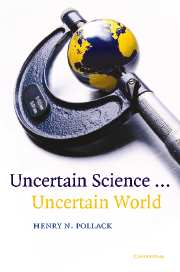Book contents
- Frontmatter
- Contents
- Acknowledgments
- About the author
- 1 Setting the stage
- 2 Uncertain about science
- 3 Can the media help?
- 4 Unfamiliarity breeds uncertainty
- 5 Fever or chill?
- 6 A fifty–fifty chance
- 7 I'm not quite sure how this works …
- 8 Let's see what happens if …
- 9 Reconstructing the past
- 10 Predicting the future
- 11 Out of the blue
- 12 In a climate of uncertainty
- Index
9 - Reconstructing the past
Published online by Cambridge University Press: 11 August 2009
- Frontmatter
- Contents
- Acknowledgments
- About the author
- 1 Setting the stage
- 2 Uncertain about science
- 3 Can the media help?
- 4 Unfamiliarity breeds uncertainty
- 5 Fever or chill?
- 6 A fifty–fifty chance
- 7 I'm not quite sure how this works …
- 8 Let's see what happens if …
- 9 Reconstructing the past
- 10 Predicting the future
- 11 Out of the blue
- 12 In a climate of uncertainty
- Index
Summary
The farther backward you can look, the farther forward you are likely to see.
Winston ChurchillThe historical sciences such as archeology, geology, and astronomy are burdened with a special form of uncertainty known as non-uniqueness. When trying to understand why something happened the way it did, these scientists must try to reconstruct the circumstances of the event, and make hypotheses about the processes that governed the event. But as we try to reconstruct an historical event, we deal with an incomplete record. And with an incomplete record of an only partially understood process, there may be more than one way that the evidence can be explained. In other words, we must live in the shadow of non-uniqueness. At any given time, the incomplete evidence may admit many interpretations, and at a later time, additional evidence may eliminate some of those possibilities.
Dealing with uncertainty about the past is a way of life with geologists, who in their work of reconstructing natural history are always working with half a deck or less. Nature is not a mindful conservator, and the inevitable consequence of time is that the record of what happened long ago becomes degraded and fragmentary. In their efforts to understand and interpret incomplete information, geologists always work with a handful of provisional scenarios relevant to explaining their observations.
- Type
- Chapter
- Information
- Uncertain Science ... Uncertain World , pp. 149 - 170Publisher: Cambridge University PressPrint publication year: 2003



